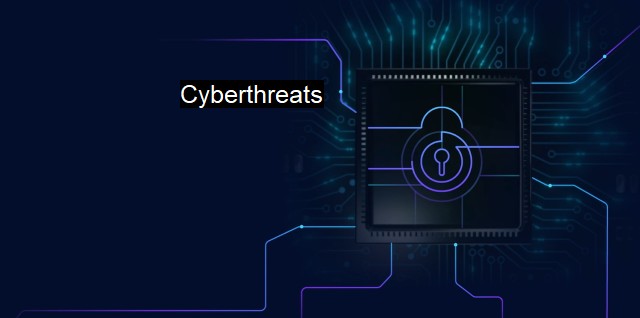What are Cyberthreats?
From Convenience to Cybercrime: The Evolving Threats to Cybersecurity and the Importance of Antivirus Measures in Safeguarding Tech Infrastructures
Cyberthreats refer to potential dangers associated with digital networks or systems that may breach the cybersecurity barriers leading to impairment of the standard functionality of these systems. cyberthreats typically aim to steal, alter, destroy or gain illicit access to sensitive data. They can also be intended for disrupting normal computer operations, leading to significant data losses.In the rapidly digitalizing global environment, cyberthreats have become increasingly prominent. Every day, millions of industries, businesses, institutions and even individual users become victims of these threats, making cybersecurity a critical concern. It is imperative to understand the comprehensive narrative surrounding cyberthreats to counteract these potential risks efficiently.
The area of cybersecurity involves practising internet safety, preventing unauthorized access, use, disclosure, interruption, modifications, inspection, recording, or destruction of information. It employs different practices, technologies, and controls to prevent and diminish the impacts of cyberthreats, aiming to maintain confidentiality, integrity, and availability of data significantly.
Additionally the term antivirus refers to software designed to detect, thwart, and remove viruses and other malicious software like worms, trojans, adware, and more. Antivirus is one of the essential aspects of the typical cybersecurity infrastructure for both businesses and personal users, shielding them against significant potential cyberthreats.
One significant form of cyberthreat is a computer virus, commonly known as malware. It penetrates computer systems usually through malicious email attachments or suspicious downloads and infects files on the system. Worms are another form of cyberthreats, which differ from viruses by doing damage to the network by consuming bandwidth, slowing it down, rather than deleting or corrupting files.
Trojans, another type of malware, disguise themselves as legitimate software or are included in legitimate software that has been tampered with. They act discreetly and create backdoors in security to let other malware in. All these threats relate to central aspects of cybersecurity, necessitating the role of antivirus.
Whoever has the intent to exploit the vulnerabilities in a system or network to gain unauthorized access can initiate cyberthreats. It could be individuals seeking personal gain, governments spying on other nations, or even cyber-criminals targeting businesses to extort money or steal sensitive information.
Pharming, phishing, ransomware, spyware are other common cyber threats that end-users face. In phishing, which is identity theft, the attacker tricks the user into revealing personal information. In pharming, the hacker's aim is to redirect a website's traffic to another fraudulent website. Ransomware involves encrypting data on the victim's system and demanding ransom to decrypt it. Spyware lurks in the background, stealing information without the user's knowledge.
Actions like Predictive Threat Intelligence, monitoring, intrusion detection systems, firewalls, and regularly updating software and hardware help curb these threats. Internet security suites and antivirus software offer a comprehensive solution for most cyber threats. A user can also shield himself by not opening suspicious emails or clicking on links from unknown sources and regularly changing and strengthening passwords.
Cyberthreats stand as challenges to the world as it embraces digitalization. Cybersecurity measures along with antivirus systems play a crucial role in counteracting these threats. Education about the potential threats and safe internet practices can also significantly reduce the risk of digital attacks. As technology advances, cyber threats are bound to become complex and harder to detect; hence cybersecurity methods and actions also need pace to keep up.

Cyberthreats FAQs
What are cyberthreats?
Cyberthreats refer to any malicious activities that are designed to compromise or damage computer systems, networks, or devices. Cyberthreats can include viruses, malware, phishing scams, and other cyberattacks.What is cybersecurity?
Cybersecurity refers to the protection of computer systems, networks, and devices from cyberthreats. This includes implementing security measures, such as firewalls, antivirus software, and data encryption, to prevent unauthorized access and protect sensitive information.What is antivirus software?
Antivirus software is a type of cybersecurity tool that is designed to detect and remove viruses, malware, and other malicious software from computer systems. Antivirus software works by scanning files and programs for known patterns of malicious code and then isolating or deleting the infected files.How can I protect myself from cyberthreats?
There are several ways to protect yourself from cyberthreats, including: 1. Installing antivirus software and keeping it up to date. 2. Creating strong passwords and changing them regularly. 3. Being cautious when opening email attachments or clicking on links from unknown sources. 4. Keeping your operating system and other software up to date with the latest security patches. 5. Using a virtual private network (VPN) to protect your internet connection from hackers and prying eyes.| | A | | | B | | | C | | | D | | | E | | | F | | | G | | | H | | | I | | | J | | | K | | | L | | | M | |
| | N | | | O | | | P | | | Q | | | R | | | S | | | T | | | U | | | V | | | W | | | X | | | Y | | | Z | |
| | 1 | | | 2 | | | 3 | | | 4 | | | 7 | | | 8 | | |||||||